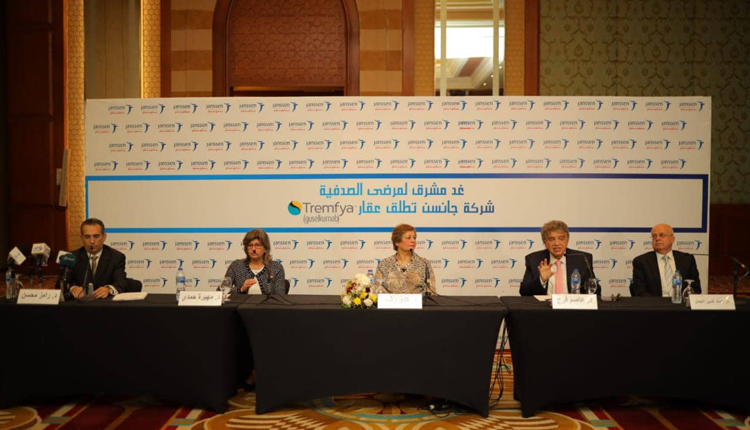Egypt’s Health Ministry approved the first biological treatment of moderate to severe plaque psoriasis patients. This treatment offers psoriasis patients both effective and long-lasting control of this disease symptoms.
It can reduce 90 percent of psoriasis area as it showed high levels in complete and sustained skin clearance just after 16 weeks, this treatment is given by subcutaneous injection through one starter dose at the beginning of the treatment and the other one after four weeks, followed by one dose every eight weeks thereafter. The patient can inject himself after taking the proper training.
Tremfya (Guselkumab) is the first biologic that selectively blocks interleukin (IL)-23 which is considered as the key driver of the immune inflammatory response in psoriasis. Because of Tremfya (Guselkumab), there will be a better tomorrow for psoriasis patients in Egypt; Psoriasis patients suffer not only from severe pain but also from social exclusion because of the community’s aversion to them despite the fact that psoriasis is a non-infectious disease,
Professor of dermatology, Dr. Assam Farag said that the plaque psoriasis is the most common form of patients. It usually appears as gradually raised areas of inflated skin covered with silvery-white scaly skin, while the top upper cortical layers peel easily, the lower ones are much more cohesive, this explains the reason behind the severe dryness, itching, swelling, and pain which most of patients’ experience. The most commonly areas where the previous symptoms appears are on the elbows, knees, scalp, ear and lower back.
He also added: statistics indicate that there are more than one million Egyptian patients, of which 145,000 are moderate and severe. People with psoriasis report physical pain and seriousness of disease, as well as its adverse emotional effects.
The social stigma contributes to poor psychosocial adjustment, so that the patient refuses any kind of close friendships/ relationships. These psycho-social impacts can therefore negatively affect the prognosis of disease.
Mahira Hamdy el Sayed, professor of dermatology, university of Ain Shams, said that psoriasis is a serious skin disease and thus a large number of research studies took place aiming to reach a new and effective treatment for IL-23.
She added: Tremfya (Guselkumab) offers an effective mechanism of action and shows superior efficacy compared with other biologic treatments through inhibiting pro-inflammatory signaling molecules (interleukins) that activate immune cells in psoriasis, as it offers long-lasting control of the symptoms of psoriasis.
Huda Rashid, professor and head of the department of dermatology of Kasr al-Ainy faculty of medicine, explained that psoriasis is a chronic disease which needs long term management. Psoriasis patients experience many adverse emotional effects such as depression, grief and embarrassment which are frequently undermined by others and can lead to a vicious cycle of despair. As public culture prevails that psoriasis is a contagious disease, therefore psoriasis patients suffer of social isolation. Our main goal is to change misconceptions and replace them with the correct scientific concepts.
She added: “we are working to always deliver new hopes for patients and help them meet all challenges at all levels.”
Huda added that the new treatment has been already approved in the United States and is used in the treatment of psoriasis; it offers people the chance of better and more sustained control of their psoriasis.
Emad al-Din Al Jamal -head of the Egyptian psoriasis association- said that psoriasis is non-infectious chronic disease, and is considered one of the most common skin diseases, where percentage of diseased persons count for 1-2 percent of total Egyptian population.
Emad explained that the reason behind the psoriasis is the increased speed of skin cells mitosis and genetics plays a role in its incidence.
Emad added that recent clinical trials tested Guselkumab efficacy and the results showed remarkable efficacy in clearing psoraises patients skins.
The managing director of Janssen in north Africa, Ramez Mohsen announced that the treatment is now being used in a number of countries around the world. The results have demonstrated superior efficacy as Guselkumab demonstrated sustained skin clearance.
50 percent of the patients reached complete skin clearance, 80 percent of the patients reached almost complete skin clearance for up to three years. The treatment has been tested in undergoing studies for three years and has proven to be complying to international safety standards. This treatment is notable for subcutaneous injection on monthly basis


